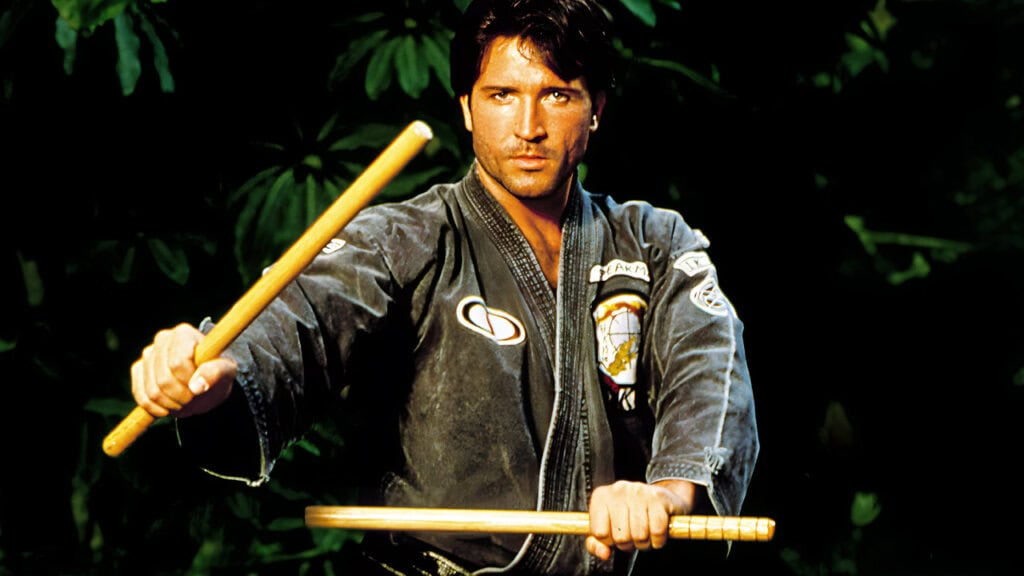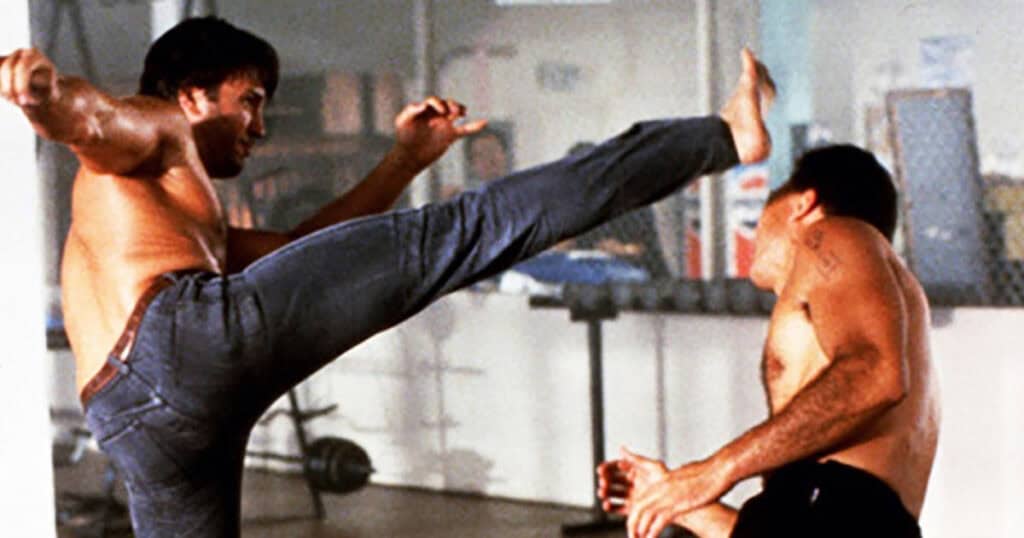
While Stallone and Schwarzenegger took the 80s by storm with their famous brand of one-man-army spectacles, the latter part of the decade would also see a new breed of tough guys branch out into a different trend of action. It wasn’t only about the ripped muscles and the gunplay and explosions. After martial arts had gone mainstream, stars such as Chuck Norris, Jean-Claude Van Damme and Steven Seagal would carve out their own little place at the box office as they brought their expertise of hand-to-hand combat to the masses.
Naturally, other studios would want to get in on the action and the best thing about jumping on this trend is the fact that there is still an aspect of originality since each star would be spotlighting a specific sect of martial arts. For example, Michael Dudikoff would showcase Ninjitsu, Seagal showcased Aikido, Phillip Rhee showcased Tae Kwan Do, and the new gun in town, Jeff Speakman, would show off his mastery in the art of Kenpo in the 1991 film The Perfect Weapon, which is the movie we take a look at in this episode of Reel Action.
The Perfect Weapon is a film that got lost in a sea of action B-movies from the late 80s/early 90s era. And it’s pretty to see why. The title is derivative of similar movies. The plot setup is a pretty run-of-the-mill revenge story. And while the newcomer star does an impressive job for his first time out, he wasn’t given the chance to bring anything particularly new to his character archetype. That being said, The Perfect Weapon is still an entertaining watch and provides you with ample action — enough to turn your brain off for 85 minutes.

Who is Jeff Speakman?
The movie was an attempt at establishing Jeff Speakman as the new formidable martial arts star that could lead his own career of action films. Speakman had achieved a black belt ranking in a traditional Okinawan style of karate called Goju-ryu. After accomplishing this high order, he would go on to further his martial arts career by studying the art of American Kenpo under the tutelage of Master Ed Parker. American Kenpo was a style founded by Parker and he was a renowned figure in the combat sport world. Parker took his knowledge of ancient Kenpo traditions and modified them with modern tactics that would ideally be applied to street fighting. It’s not unlike what had also been achieved by a peer of Parker’s – someone you might’ve heard of…named Bruce Lee. While Lee had also modified ancient traditions for street fighting, his style of Jeet Kune Do was rooted in Chinese Kung Fu, while Parker’s American Kenpo is rooted in the ancient traditions of Karate.
Parker would dabble in Hollywood himself, as he played intimidating figures in such films like the Pink Panther movies, where he would get to show off his fighting system.
And it’s this style that’s being showcased in The Perfect Weapon. We are introduced to Speakman in a manner that aims to appeal to everyone. From the start, he’s shown as a humble, blue collar worker by day. Then, by night, he trains in his living room, showing off his forms and it would tease how fast his hand speed is. The movie unapologetically flaunts his rugged good looks that proves he has the image to be a leading man and the physique to go toe-to-toe with many combatants, as well as making an effort to compete with Van Damme’s sex appeal. One that continuously got him catcalls. This intro gives us a first look into the Kenpo form as Speakman performs his kata to an immensely popular 90s tune.
Speakman plays a character named Jeff Sanders. He embarks on a journey back home to LA to check in on a family friend. And during his drive, we’re treated to some background on his character via flashbacks. We learn that Jeff has had a bad temper as a teen. And as his policeman father nearly sends him away to the military academy, his old war buddy, Kim, instead has him enroll in a Kenpo school. We get a montage of Jeff’s progress in earning higher degrees and it’s here that the movie teaches the audience the basic principles of the art. Jeff’s teacher, Master Lo, describes it as “a combination of ancient fighting techniques and modern scientific principles. An unending flow of motion. A force, which can overwhelm any attacker. Every move creates a specific reaction in your opponent. Each reaction leads you to your next move. Every strike is a block. Every block, a strike. Each move flows into the next. This logical and sequential flow of action is the essence of Kenpo.”
It’s revealed that an incident at Jeff’s high school resulted in severed ties between him and his dad. During a pole vaulting training session (a skill that comes back later on), a particularly rowdy football player starts harassing Jeff and his younger brother Adam. It escalates to the point of physical violence, which makes Jeff’s temper flare and he responds in kind with his new found skill. After settling legal matters, Jeff’s dad throws him out of the house and Kim becomes his father figure. Which is why feels the need to reconnect with him. Lo and behold, Kim is facing trouble at his store when a local Korean mob is shaking him down for money. Jeff shows up just in time and beats on these goons. Usually in movies, you don’t see the fallout on the henchmen, but in the next scene, they hilariously show up in neck braces and arm slings.
The pleasantries with Jeff and Kim would be short-lived. The mob henchmen’s failure with Kim would have their boss bring in the big guns — a hulking enforcer named Tanaka, who kills his victims with blunt force and leaves a signature white flower behind. Unfortunately, Jeff arrives too late at Kim’s store, only to find that he’s been murdered and the flower was left on his body. Now, Jeff takes it upon himself to investigate who could’ve ordered this hit. The detective who simultaneously gets assigned to the case happens to be Jeff’s estranged little brother Adam. Adam is played by John Dye. And if Anthony Edwards and James Spader were cloned into a third person, it’d be John Dye. Martial arts film fans will probably recognize Dye from the first Best of the Best film as Virgil.
Both brothers are now on a mission to find Kim’s killer. And both have their own ways of doing it. Adam’s light touch as a professional lawman gets him in comedic situations. There’s a particularly fun scene with a restaurant host that plays out like an Abbott & Costello routine. (“Kimchi!”) Meanwhile, Jeff’s head-on approach naturally gets him into fights. Much like the one in a scene that’s one of the film’s biggest highlights. Jeff fights three guys in a martial arts studio in exchange for some information. One of them, played by stuntman and actor James Lew, was someone I always thought closely resembled the Liu Kang sprite model from the first Mortal Kombat game. This scene gives you a good look at the fury of Kenpo and shows what Speakman can bring to the table. Van Damme’s fights were usually more leisurely-paced and full of dynamic single moves. Seagal’s fights were usually more efficient and very technical. Here, Speakman would pulverize his foes with lightning quick speed and multiple blows.

Jeff’s investigation in Korea Town unknowingly gets him involved in a war with Korean mob rivals. One of the bosses, named Yung, points Jeff in certain directions as his vengeance blinds him from the bigger situation that’s building. The rabbit hole that Jeff finds himself in introduces us to characters that are portrayed by some recognizable faces in the genre. Yung is played by recent Hollywood Walk of Fame honoree James Hong, who audiences might know from Big Trouble in Little China, Wayne’s World 2, Seinfeld and Everything Everywhere All at Once. Yung is revealed to be a powerful figure in Korea Town. One with connections to the Yakuza. This explains why he has Tanaka at his beck and call. Tanaka is played by former professional wrestler, Professor Toru Tanaka, who is arguably more recognizable through his movie roles as he’s made impressions in films like Revenge of the Ninja, 3 Ninjas and as Sub-Zero in the Arnold Schwarzenegger movie, The Running Man. Another underling working for Yung is Kai, who is played by Cary-Hiroyuki Tagawa. Viewers may recognize him as the villain from Showdown in Little Tokyo, Rising Sun and of course, as Shang Tsung in Mortal Kombat.
Jeff’s allies in this movie are also portrayed by actors with some recognizable faces. His father figure, Kim, is played by Mako, who has history with legends in the genre. He fought Bruce Lee one-on-one in an episode of The Green Hornet. He played Jackie Chan’s uncle that taught him Kung Fu in Battle Creek Brawl and he was the Miyagi equivalent in the Chuck Norris/Jonathan Brandis movie, Sidekicks. Kim was a father figure to more than just Jeff as he is revealed to also be looking after a young orphan named Jimmy, who is played by Dante Basco, but he’s better known to a whole generation as Rufio.
One person you’d expect to see as another ally, as you see their name in the opening credits, is actress Mariska Hargitay. The flashbacks set her character up to be a romantic interest, but every scene with her features no dialogue and her appearances barely last 30 seconds. That’s because all her scenes were cut out of the movie. However, the TV broadcast cut reinstates her subplot and it’s revealed that she’s integral to Jeff’s character growth. The TV version is currently on YouTube, so if you’re curious, check it out.
Is The Perfect Weapon worth seeing?
The Perfect Weapon is directed by Mark DiSalle, whose only other directing credit is Van Damme’s Kickboxer. However, he would be a producer on a number of Van Damme’s early breakout movies. And the movie’s script was written by David C. Wilson, who also has a curiously thin filmography as his two other writing credits include the 2000 sci-fi Supernova and a “story by” credit on the 2015 Guy Ritchie movie, The Man from U.N.C.L.E.
Unfortunately, it wasn’t in the cards for this movie, and it would debut at number 6 on its opening weekend as Silence of the Lambs continued its box office reign for its sixth week. Jeff Speakman had signed a three-picture deal with Paramount, which would have included a sequel to The Perfect Weapon, but the studio would change regimes, and it never came to fruition. His deal ultimately fell through, but there was already development for his third movie, which would’ve been about a cop who fights a terrorist. That script eventually found its way to 20th Century Fox and became the Keanu Reeves movie, Speed. Speakman continued acting until 2006, but it would mostly be straight-to-video titles. In 2013, he would fall ill due to throat cancer, but just as he does to the bad guys in this movie, he would beat that sickness into submission and make a full recovery. Speakman never stopped practicing his disciplines, and as recently as 2022, he would achieve a tenth-degree blackbelt in Goju-Ryu.
While not groundbreaking, The Perfect Weapon still has a charm to it that elevates it above many titles that tried to compete in the genre. It never tries to be more than it is and it’s a brisk watch. So, if you can, check it out.
The post The Perfect Weapon: Jeff Speakman’s Kenpo classic is awesome! appeared first on JoBlo.
Leave a Reply